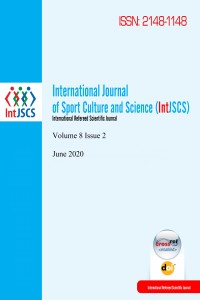Abstract
References
- Adair, J. (1973) The Action-centred Leader: 3-4. [online] Published: 2010 [accessed May 12, 2020] Available from: http://www.valuing-your-talent-framework.com/sites/default/files/resources/THK-032%20John%20Adair.pdf
- Armstrong, M. (2014). Armstrong’s handbook of human resource management practice / Michael Armstrong. – 13th Edition. UK, London: Ashford Colour Рress Ltd.
- Bennis, W. (2010). We need leaders, Leadership Excellence, 27(12):4.
- Burns, J. M. (1978). Leadership. New York: Harper & Row:44-45.
- Cotterill, S. & K. Fransen (2016). Athlete Leadership in Sport Teams: Current Understanding and Future Directions. International Review of Sport and Exercise Psychology, 2016 Vol. 9, No. 1:123-124.
- Fiedler, F. E. (1967). A Theory of Leadership Effectiveness. New York: McGraw-Hill.
- Fransen, K., Vanbeselaere, N., De Cuyper, B., Vande Broek, G., & Boen, F. (2014). The myth of the team captain as principal leader: Extending the athlete leadership classification within sport teams. Journal of Sports Sciences, 32(14):1389-1397.
- Gold, J., R. Thorpe & A. Mumford (2010). Gower Handbook of Leadership and Management Development. Farnham, Gower.
- Goleman, D. (2001). What Makes a Leader, Boston, MA: Harvard Business School Press.
- George, B. (2003). Authentic Leadership. San Francisco, CA: Jossey-Bass.
- Harter, S. (2002). Authenticity, Handbook of Positive Psychology. Oxford: Oxford University Press.
- Huczynski, A., D. Buchanan (2007). Organizational Behaviour, 6th Edition, Harlow: FT Prentice Hall.
- Kouzes, J. & B. Posner (2003). The Leadership Challenge, San Francisco, CA: Jossey-Bass.
- Lewin, K., R. Lippitt & R. K. White (1999). Patterns of aggressive behaviour in experimentally created “social climates”. In M. Gold (Ed.), The complete social scientist: a Kurt Lewin reader. Washington, DC: American Psychological Association.
- Paunov, M. (2001). Motivation. Sofia: University of National and World Economy.
- Stogdill, R. M. (1950). Leaders, membership and organization. Psychological: Bulletin, 25:3. Tamkin, P., G. Pearson, W. Hirsh & S. Constable (2010). Exceeding Expectation: The principles of outstanding leadership. London: The Work Foundation.
- Tavanti, M. (2008). Transactional Leadership: The key concepts. London: Routledge.
- Ulrich, D. & N. Smallwood (2007). Leadership Brand: Developing customer-focused leaders to drive performance and build lasting value. Boston, MA: Harvard Business School Press.
Abstract
In team and sports circles, leadership today is a key aspect of sporting success and achievement. In the last two or three decades, numerous studies have been conducted that deal with the role and skills of team leaders in sports performance, the assessment of leadership and its impact on team building, their effectiveness and dynamics.
This article examines the role and importance of team leaders' skills in representing them in sport, while assessing the key competencies of a leader through the prism of different leadership styles and ideas. By identifying the main leadership skills in sports, the article tries to present and analyze what are some of the strengths, qualities and competencies that build these leadership skills and how they persuade teams to perform in sports.
Keywords
References
- Adair, J. (1973) The Action-centred Leader: 3-4. [online] Published: 2010 [accessed May 12, 2020] Available from: http://www.valuing-your-talent-framework.com/sites/default/files/resources/THK-032%20John%20Adair.pdf
- Armstrong, M. (2014). Armstrong’s handbook of human resource management practice / Michael Armstrong. – 13th Edition. UK, London: Ashford Colour Рress Ltd.
- Bennis, W. (2010). We need leaders, Leadership Excellence, 27(12):4.
- Burns, J. M. (1978). Leadership. New York: Harper & Row:44-45.
- Cotterill, S. & K. Fransen (2016). Athlete Leadership in Sport Teams: Current Understanding and Future Directions. International Review of Sport and Exercise Psychology, 2016 Vol. 9, No. 1:123-124.
- Fiedler, F. E. (1967). A Theory of Leadership Effectiveness. New York: McGraw-Hill.
- Fransen, K., Vanbeselaere, N., De Cuyper, B., Vande Broek, G., & Boen, F. (2014). The myth of the team captain as principal leader: Extending the athlete leadership classification within sport teams. Journal of Sports Sciences, 32(14):1389-1397.
- Gold, J., R. Thorpe & A. Mumford (2010). Gower Handbook of Leadership and Management Development. Farnham, Gower.
- Goleman, D. (2001). What Makes a Leader, Boston, MA: Harvard Business School Press.
- George, B. (2003). Authentic Leadership. San Francisco, CA: Jossey-Bass.
- Harter, S. (2002). Authenticity, Handbook of Positive Psychology. Oxford: Oxford University Press.
- Huczynski, A., D. Buchanan (2007). Organizational Behaviour, 6th Edition, Harlow: FT Prentice Hall.
- Kouzes, J. & B. Posner (2003). The Leadership Challenge, San Francisco, CA: Jossey-Bass.
- Lewin, K., R. Lippitt & R. K. White (1999). Patterns of aggressive behaviour in experimentally created “social climates”. In M. Gold (Ed.), The complete social scientist: a Kurt Lewin reader. Washington, DC: American Psychological Association.
- Paunov, M. (2001). Motivation. Sofia: University of National and World Economy.
- Stogdill, R. M. (1950). Leaders, membership and organization. Psychological: Bulletin, 25:3. Tamkin, P., G. Pearson, W. Hirsh & S. Constable (2010). Exceeding Expectation: The principles of outstanding leadership. London: The Work Foundation.
- Tavanti, M. (2008). Transactional Leadership: The key concepts. London: Routledge.
- Ulrich, D. & N. Smallwood (2007). Leadership Brand: Developing customer-focused leaders to drive performance and build lasting value. Boston, MA: Harvard Business School Press.
Details
| Primary Language | English |
|---|---|
| Subjects | Sports Medicine |
| Journal Section | Articles |
| Authors | |
| Publication Date | June 20, 2020 |
| Published in Issue | Year 2020 Volume: 8 Issue: 2 |


